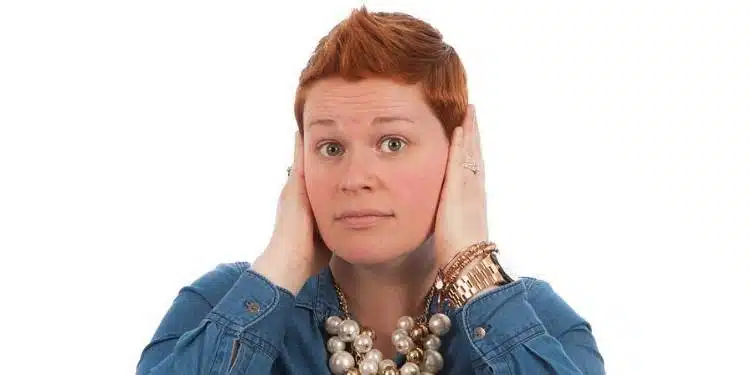“Turn down the TV!”
My Hearing Loss Gradually Snuck Up on Me
It wasn’t as though one day I realized I did not hear well. My hearing loss snuck up on me slowly over the last few years. I actually didn’t realize that I now hear fewer sounds until my husband forced me to have a conversation about it. I do know I frequently ask people to repeat their comments or questions nowadays, and I know that can irritate others. I used to get annoyed with people who asked me to repeat myself, which I feel badly about now. I hope people have more patience with me than I had for others as I continue to age.
Have You Had a Hearing Test?
According to the nationalhearingtest.org website, approximately 36 million Americans have significant hearing loss but never had a hearing test. Could one of them be you?
Many people don’t seek help for their hearing loss. Some, like me, are in denial. Others worry about how hearing aids look and what people may think. People who use hearing aids tell me the technology is much improved and some devices are so small they are barely noticeable.
When Should You Have Your Hearing Evaluated?
How do you know when it’s time to seek a hearing evaluation? For me, the first step was to acknowledge I might have a problem. As I watched my parents age, I knew that untreated hearing loss can lead to a decline in quality of life, social isolation, problems on the job, and frequent embarrassment. I know these facts intellectually, but emotionally, it is difficult to admit I needed help.
Once I accepted I may have a problem, I decided to take a test. My family doctor suggested I start with a basic screening rather than go first to an audiologist. AARP recommends a scientifically validated hearing screen test called the National Hearing Test (NHT) as a more convenient way to proceed initially. This telephone-administered screening is an independent test developed with funding from the National Institutes of Health (NIH). AARP offers its members the opportunity to take this test once/a year for free. The test, which takes about 4 minutes per ear, costs only $8.00 for those who are not AARP members. The NHT very effectively detects the most common forms of hearing loss, those that are age-related and those that result from exposure to loud noises. Other less common types of hearing problems require a different approach. The National Hearing Test (NHT) helps you decide whether to seek a full hearing evaluation. However, even if you pass this test, if concerned about your hearing you may still want to see an audiologist for further assessment.
Age-Related Hearing Loss
It turns out I have mild age-related hearing loss. I learned recently the technical term for this condition is presbycusis. I ignored the signs for years simply because I didn’t want to have a hearing problem; it made me feel old. I am now in a place where I admit my hearing is less sensitive now than when I was younger and acknowledge it is a normal part of aging. I also feel better about growing older in general. It’s certainly better than the alternative.
More information on the National Hearing Test
ClearCaptions -Free phone Service for Hearing Impaired Individuals
Mental Health Issues Related to Hearing Loss
My hearing issues will likely get worse as I continue to age. I try to exercise patience and sensitivity with others with hearing loss and I hope people will be patient with me. It can have a significant impact on mental health, leading to various emotional and psychological challenges. Here are some of the issues that can result from a hearing impairment.
Social Isolation:
With the onset of hearing issues, you may experience social isolation as communication becomes more challenging. I’ve noticed with elderly loved ones that difficulty hearing in group settings or understanding conversations can lead to withdrawal from social activities.
Depression:
A sense of isolation due to hearing loss can contribute to feelings of sadness and depression for some. This may be exacerbated by a perceived loss of connection with others.
Anxiety:
Do you fear you might be unable to fully participate in conversation or that you miss important information? I do, and it definitely causes anxiety for me. And some people, including me, feel embarrassed in social situations due to communication difficulties.
Low Self-Esteem:
Feeling self-conscious about asking others to repeat themselves experiencing communication breakdowns often leads to low self-esteem. No one wants to feel like a burden in a conversation.
Anger and Frustration:
Difficulty hearing and the constant effort required to understand conversations can cause some people to become frustrated and angry.
Impact on Family and Relationships:
The challenges associated with hearing loss can affect family dynamics and your relationships. Loved ones may need to make adjustments to accommodate your hearing loss, and misunderstandings can strain relationships.
Fear of Stigmatization:
Some individuals fear being stigmatized or judged by others. This fear can contribute to avoidance of social situations and reluctance to seek help.
The Bottom Line
It’s hard to come to accept you suffer from hearing loss. I get it. However, it’s crucial to seek support from healthcare professionals, audiologists, and mental health experts if you have issues. Addressing hearing loss can significantly improve overall well-being and reduce the impact on mental health. In addition, some might find support groups beneficial for coping with the emotional aspects of hearing loss. It’s always helpful to know you are not alone.










